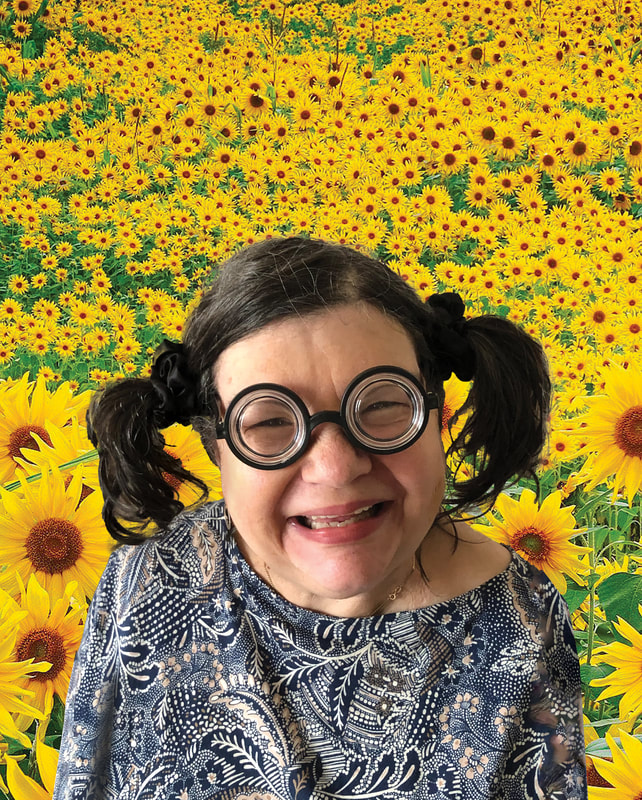Doris Home | Video Clip |
|
DORIS DOES THE EDINBOIGER FRIDGE
written and performed by Bette Carlson Siler Doris is not your average little old lady. Yes, she's little (at least vertically). She's old (70 and counting). However, she is adept at several things not associated with the elderly set. For one, she's a wizard at anal bleaching (care to pick up a tip?) and an authority on Brazilian shaves. There are some things that Doris struggles with, though. She's still searching for her place in the world… and perhaps that elusive friend? Doris, in her hilariously idiosyncratic style, makes a profound journey. Some kudos: "A brilliant performance", "Incredible acting", "Hilarious and heartbreaking". Not suitable for people under 16 unless they are drunk. |
About the Playwright/performer

Bette Carlson Siler is an actor, playwright and director. Bette’s plays have been produced by The Estrogenius Festival and Emerging Artists in New York City, New Jersey Repertory Company and the Vermont Playwrights Circle. During the pandemic, her plays were part of "Healing Voices", produced by the McCarter Theatre Centre and the George Street Playhouse. She is a member of the Woodstock Fringe Playwrights Unit and has developed, directed and performed plays with the Fringe since 2011. As an actor, she’s been fortunate enough to study monologue work with Stella Adler in New York, Chekhov with Earle Gister (Yale School of Drama) and Shakespeare with Toby Robertson (RSC, Old Vic). She has performed at Arena Stage/Living Stage in Washington, D.C., California Actors Theatre in Los Gatos, and at the Pacific Conservatory of the Performing Arts in Santa Maria, California. Some of her favorite roles include Winnie in Beckett’s Happy Days (directed by Wallace Norman), Vivian Bearing in Wit and Jenny Diver in The Threepenny Opera. Taking this triptych of plays to Edinburgh is a dream come true… and there is no one she'd rather throw her hat in the ring with than Ric Siler and Wallace Norman. You take the high road and I'll take the… well, you know the drill. See ya in sunny Scotland!
Origin of Doris
During the pandemic, live theatre was all but absent. Therefore, Doris was originally conceived as a recurring character in a web series. Several vignettes were written featuring Doris in a variety of adventures. Some titles are: DORIS COOKS, DORIS GOES ON TINDER, DORIS FINDS GOD, DORIS DARNS A SOCK (a personal favorite), DORIS ON A DIET, DORIS ON THE WAGON and HEART SHAPED THING (why Doris' ex-boyfriend dumped her for a woman who does hairstyling for vaginas). Several of these were read on Zoom to appreciative audiences. When the time came for considering the Edinburgh festival, these were morphed into a longer solo piece for live theatre. While the web series vignettes are largely like skits or stand-up material, a longer piece necessitated "fleshing" the character out. Even Mel Brooks admits that doing a lengthier piece requires more truly human elements (think BLAZING SADDLES). So, after investing over a year on Doris' eccentricities, Bette focused on commonalities with people who were Doris' age and had her educational background. What makes Doris human? Why is she here in Edinburgh? That is when the piece became a comedy/drama, raising the stakes for the character and creating someone who we may relate to and care for. That's when Doris went from cartoon to character.
Doris Speak to a Special Community
When we talk about disenfranchised/underrepresented populations, we often think of people who may be disadvantaged due to religious, ethnic and cultural prejudices. But, we ask you, what about the elderly? How often are older people ignored and shunned, simply because of a number? Further, when we think of an elderly person, do we assume that he/she/they are conservative, careful and inflexible? Or are they still looking for delight, adventure… and most importantly, a connection to other human beings? DORIS DOES THE EDINBOIGER FRIDGE is a comedy/drama about connecting to other people. James Baldwin said:
"Art has to be a kind of confession…. The effort, it seems to me, is: If you can examine and face your life, you can discover the terms with which you are connected to other lives, and they can discover, too, the terms with which they are connected to other people.
This has happened to every one of us, I'm sure. You read something which you thought only happened to you, and you discovered it happened 100 years ago to Dostoevsky. This is a very real liberation for the suffering, struggling person, who always thinks he is alone. That's why art is important."
Doris, in her hilarious and unconventional style, makes that profound journey.


